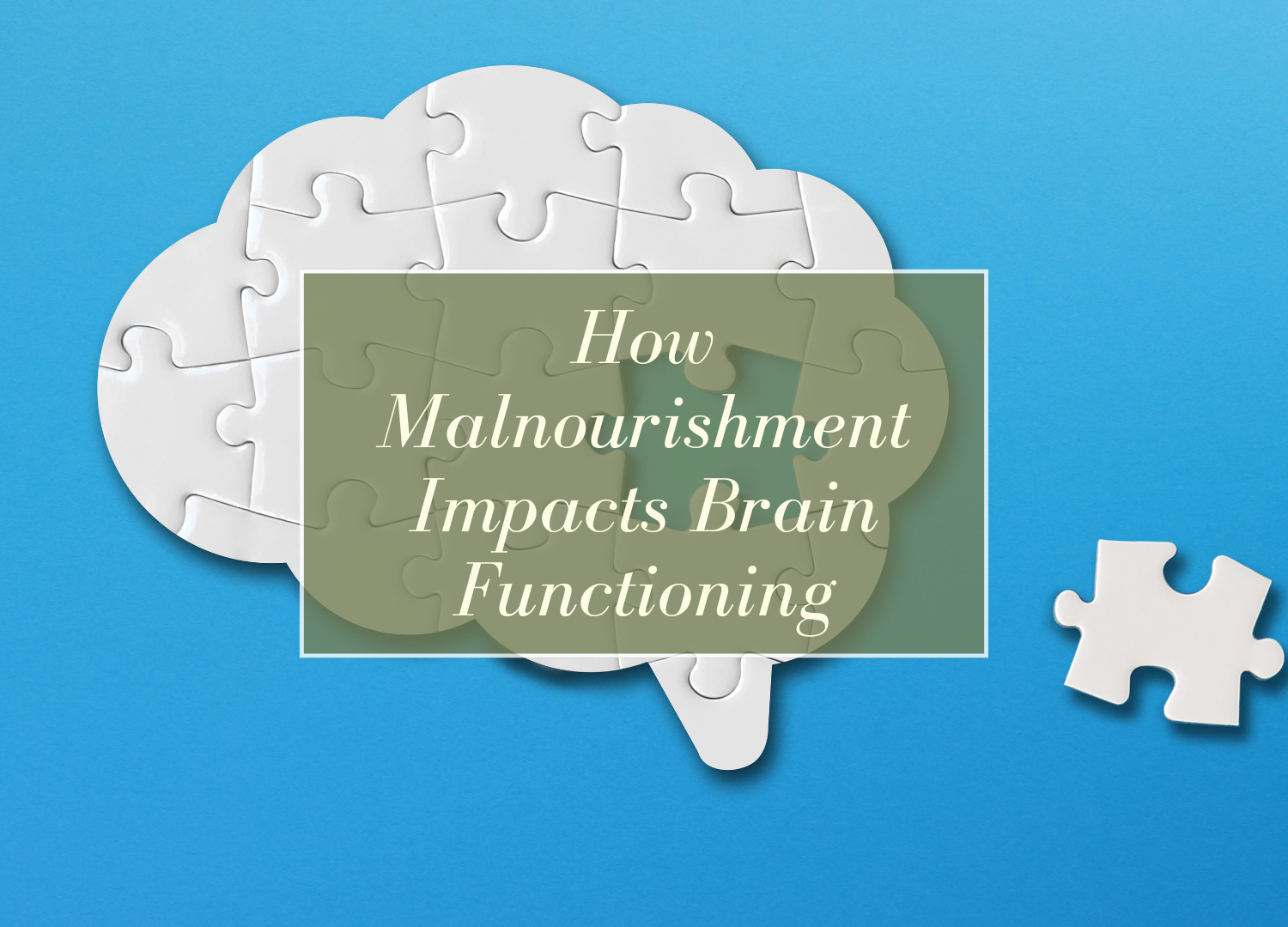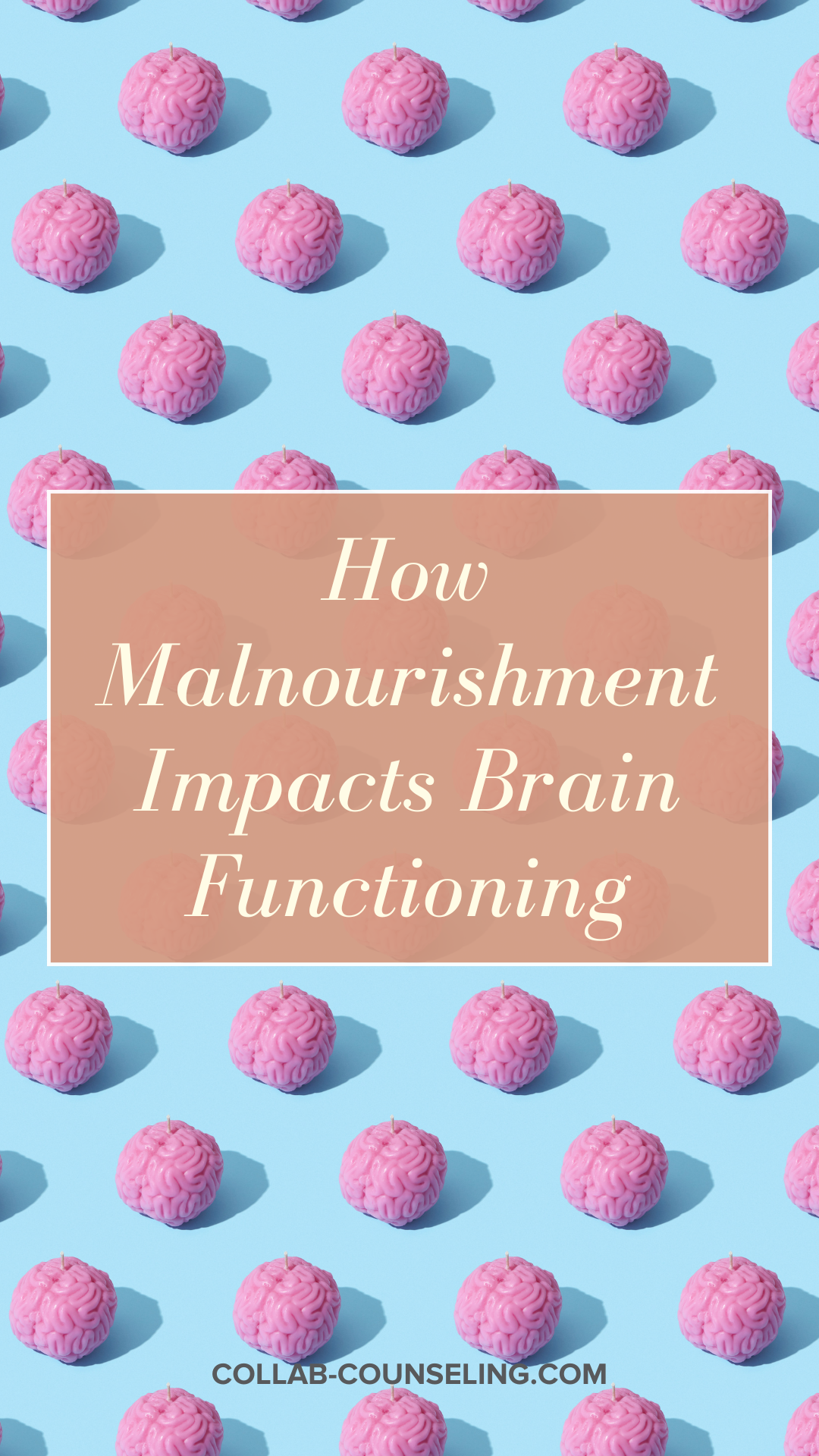How Malnourishment Impacts Brain Functioning
Eating disorders are often just seen as an issue where someone can’t/doesn’t want to eat food. To anyone with an eating disorder, this statement underscores the reality of what it’s like to live with one. In honor of Mental Health Awareness Month, we are talking about how eating disorders impact brain functioning and why, for many reasons, recovery is not as simple as just eating more food.
How Malnourishment Impacts Brain Functioning
In previous blog posts, we’ve covered a variety of different eating disorders and a high-level overview of how they impact the body. One area of education I’ve been sharing with my clients lately is how eating disorders impact brain functioning.
Clients will say to me every week:
“Why can’t I just snap out of it?!”
“I know my body needs food, so why is it so hard to just eat my meal?!”
“I’ve been struggling with this eating disorder for [X length of time], shouldn’t I be over it by now?”
While recovery from an eating disorder looks different from person to person, it’s important to understand the role the brain plays in making (parts of) recovery so challenging.
What Happens When We Restrict?
Contrary to what diet culture may lead you to believe, when we restrict food for a diet, a ‘lifestyle change’, or an eating disorder, our body and brain don’t know that. When our brain doesn’t get enough to eat, it doesn’t interpret it as “Molly must just to cutting back on food so she can fit into a specific dress this summer!” which might be the reason for a decrease in food intake. Instead, your brain registers it as “Something is going down. We must protect Molly and keep her alive. We must adjust!”
When we consume less food for a diet or eating disorder, our brain and body respond in the way they are biologically wired to when encountering starvation. To conserve energy, the metabolic rate is decreased so fewer calories are burned, digestion and heart rate slow, blood pressure is lowered, less blood flow is sent to the hands and feet (this is why you are always cold!), and decreased energy output to encourage stillness and rest.
The brain also puts your system on high alert, becoming more anxious and vigilant. This can lead individuals to feel more fearful, resistant to change, and more rigid, putting their body in a state of fight/flight. This change can also make it difficult to fall and stay asleep because the body is staying alert to check for danger and ensure safety.
What all this means: your brain is designed to keep you alive, so when it encounters famine-like conditions, it adjusts accordingly.
Brain Anatomy
Since we are talking about the brain, it’s important to understand the basics of brain functioning and structure.
The brain has 3 different regions, all responsible for different tasks.
The Hindbrain: also known as the reptile brain, is the lowest part of the brain. Its job is to keep us alive. It works on a subconscious level, carrying out body processes automatically like breathing, dilation of blood vessels, heart beating, and more.
The Midbrain: connects the forebrain (cerebrum) and hindbrain (spinal cord), and together with the hindbrain, makes up the brainstem. Its job is to regulate movement and the processing of audio/visual cues, like sleeping and wakefulness.
The Forebrain: aka, the smart part of our brain, and also the largest part. Its job is all about high-level functions like thinking, feeling, interpreting the world, and memory. It also regulates emotions and coordinates movements. It includes two important components – the Thalamus and the Hypothalamus.
Neurotransmitters
Our brains process a lot of information on a daily basis with the help of chemical messengers called neurotransmitters. Let’s look at some of the neurotransmitters impacted by restricted food intake.
Serotonin: responsible for controlling mood and happiness. It also regulates memory, hunger, sex, and sleep.
Dopamine: responsible for a number of things like energy, blood flow, digestion, focus, mood, emotions, heart and kidney function, pain processing, sleep, and stress response.
Norepinephrine: helps with energy and alertness
Acetylcholine: aids in learning and memory
Gamma-aminobutyric acid (GABA): helps calm anxiety
For neurotransmitters to work effectively and conduct electricity, they require a protective layer of lipids, or fats (that delicious macronutrient that many like to restrict, even though it makes food taste so good!). Restrictive eating disorders that result in inadequate fat intake can damage this protective layer and have a negative impact on the structure of the brain.
How Do Eating Disorders Impact Brain Functioning
Malnourishment
Our brain accounts for 20% of our daily energy intake – read: food intake. 20%! Without adequate intake to act as fuel for our brain and our body, as we outlined above, multiple bodily systems shift and adapt. Not only will a malnourished brain not function properly, but it also causes difficulties with fear, anxiety, depression, impulse control, concentration, problem solving, decision making, sleep, digestion, temperature regulation, and more.
Alterations in the Reward System of the Brain
Let’s get back to our neurotransmitters, specifically dopamine. Dopamine is the ‘reward’ neurotransmitter and is released when we experience a reward, like eating a really delicious meal, spending time with the people we love most, snuggling a kitten or puppy, moving our body, learning new things, and achieving goals or rewards.
Studies show that eating disorders can alter the reward/punishment system, or the mesolimbic system. Rather than feeling pleasure from eating a meal, individuals with eating disorders feel a reward when they engage in behaviors like restriction, overexercise, and binge eating. The release of dopamine has effectively switched to allow for pleasure when doing behaviors and punishment when not.
Telling someone with an eating disorder to ‘just eat food’ might feel well-meaning, but because of the alteration in dopamine release, it’s even more challenging to follow this ‘advice’. Additionally, research shows that folks with anorexia can have a difficult time learning from reward, but too easy a time learning punishment. Individuals with binge eating disorder might feel more rewarded when engaging in binging behavior.
Serotonin Level Dysregulation
Nicknamed ‘The Happy Hormone’, serotonin has two functions: a neurotransmitter in your brain and a hormone in your gut. In fact, 95% of the serotonin in the body is produced in the GI tract, with only 5% being produced in the brain. Serotonin actually starts out as tryptophan, an essential amino acid that is only derived from our diet. Our brain serotonin stores decrease with a restrictive diet, leading to dysregulation and more.
In our brain, serotonin helps regulate mood, including depression and irritability, and is key in a variety of processes like regulating sleep, hunger, memory, learning, and executive functioning. As a hormone, serotonin is produced by cells and released throughout the GI tract, aiding in food digestion.
Serotonin level dysregulation can contribute to irritability, impulsivity or difficulty with impulse control, anxiety, depression, fatigue, and problems with sleep, digestion, and cognitive processes.
Structural Changes in the Brain
Studies show that eating disorders can cause alterations in the volume of gray and white matter in the brain. Malnutrition can cause the brain to actually shrink, also known as cerebral atrophy. Muscle control, memory, speech, decision making, and self-control are all functions that involve the gray matter of our brain. Reduction in both gray and white matter can lead to body perception distortions, intensified habit formation, impulsiveness, and more.
What all this means: These few impacts clearly illustrate that eating disorders can have a profound impact on our brain and body. It’s not just about the food. And we haven’t even covered how trauma and early childhood experiences can have an impact on the brain and eating disorder (post still to come).
Neuroplasticity
The impact of eating disorders is far-reaching. But, the good news is that rewiring of our brain can be done as we move through recovery. A nourished brain is a working brain. Adequate nutrition is key, and it might seem like it’s all about the food in recovery. Nutritional intake is so important because it helps the brain start working again, which is needed to help sort and process things.
Let’s explore neuroplasticity. It’s the ability of the brain to change its structure and function in response to stimuli. This video provides a great visual and audio explanation, and I pulled an important snippet:
“There are billions of pathways that light up every time you think, feel, or do something. The pathways that are well-traveled are our habits and our established ways of thinking, feeling, and doing. Every time we think in a certain way, do a certain task, or feel something specific, we strengthen that pathway. When we strengthen the pathway, it becomes easier for our brains to automatically take that same path.”
Neural pathways are created as eating disorders develop, and the paths become well-worn each time you do a behavior or engage in a way of thinking. As you recover, you are literally creating new neural pathways in your brain as you work toward shifting ways of thinking, decreasing the use of behaviors, and processing trauma. The thing with creating a new path is that it requires practice and repetition. As this happens, the old path weakens since it is used less, and the new path begins to feel as comfortable as the old. Pretty cool, right?
Moving Forward
Eating disorders are complex mental health conditions that impact a variety of bodily systems. It’s not just about the food, and recovery is more than just eating food. If you or someone you love is struggling with an eating disorder, please reach out to our team today!
Collaborative Counseling & Nutrition is an outpatient nutrition and body image counseling center, with locations in Indianapolis and Carmel, that provides compassionate, holistic eating disorder treatment. Through practicing mindfulness, intuition, and Health At Every Size, we are on a mission to help you find a true state of well-being! We take an anti-diet, weight-inclusive approach with all our clients and work to help guide you towards a way of healthy living designed by you, just for you! This post is for education purposes only and should not be used as a substitute for treatment for an eating disorder. If you are looking for a registered dietitian or therapist to assist you on your recovery journey, please reach out today!
Sources Used:
[1] Tejani, H. (2021, September 3). The Malnourished Brain. Dietetically Speaking. https://dieteticallyspeaking.com/the-malnourished-brain/
[2] Bailey, R. (2025, April 29). Divisions of the brain: forebrain, midbrain, hindbrain. ThoughtCo. https://www.thoughtco.com/divisions-of-the-brain-4032899
[3] Ackerman, S. (1992). Major structures and functions of the brain. Discovering the Brain - NCBI Bookshelf. https://www.ncbi.nlm.nih.gov/books/NBK234157/
[4] Marieee. (2023, June 12). Malnutrition & The Brain. Pearls of Nutrition. https://pearlsofnutrition.com/2023/06/malnutrition-the-brain/
[5] Equip. (2020, October 6). Eating Disorders and the Brain: What We Mean When We Say that Eating Disorders Are Brain Disorders. https://equip.health/articles/understanding-eds/braindisorders/
[6] Jappe, L. M., Frank, G. K., Shott, M. E., Rollin, M. D., Pryor, T., Hagman, J. O., Yang, T. T., & Davis, E. (2010). Heightened sensitivity to reward and punishment in anorexia nervosa. International Journal of Eating Disorders, 44(4), 317–324. https://doi.org/10.1002/eat.20815
[7] Mental Health America. (2025, January 6). What is serotonin? | Mental Health America. https://mhanational.org/resources/what-is-serotonin/
[8] Banskota, S., Ghia, J., & Khan, W. I. (2018). Serotonin in the gut: Blessing or a curse. Biochimie, 161, 56–64. https://doi.org/10.1016/j.biochi.2018.06.008
[9] Appleton, J. (2018, August 1). The Gut-Brain Axis: Influence of microbiota on mood and mental health. https://pmc.ncbi.nlm.nih.gov/articles/PMC6469458/
[10] Kaye, W. H., Wagner, A., Fudge, J. L., & Paulus, M. (2010). Neurocircuity of eating disorders. Current Topics in Behavioral Neurosciences, 37–57. https://doi.org/10.1007/7854_2010_85
[11] Steiger, H. (2004, January 1). Eating disorders and the serotonin connection: state, trait and developmental effects. https://pmc.ncbi.nlm.nih.gov/articles/PMC305267/
[12] Haleem, D. J. (2012). Serotonin neurotransmission in anorexia nervosa. Behavioural Pharmacology, 23(5 and 6), 478–495. https://doi.org/10.1097/fbp.0b013e328357440d
[13] Lampert, J. (2025, January 30). Eating Disorders and Brain Health | The Emily Program. The Emily Program. https://emilyprogram.com/blog/eating-disorders-and-the-brain/


